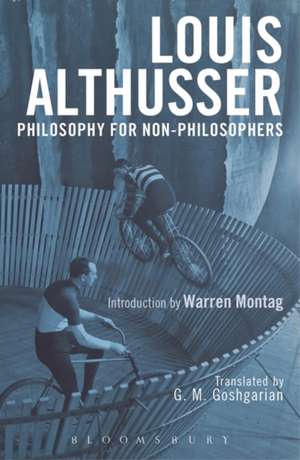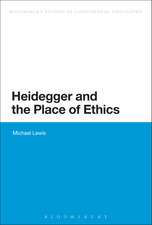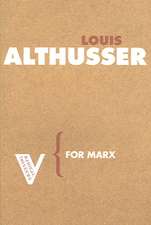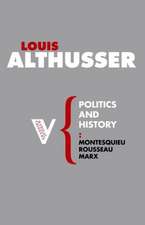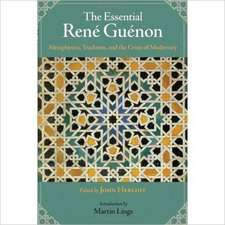Philosophy for Non-Philosophers
Autor Louis Althusser Traducere de G. M. Goshgarianen Limba Engleză Paperback – 22 feb 2017
| Toate formatele și edițiile | Preț | Express |
|---|---|---|
| Paperback (1) | 176.86 lei 6-8 săpt. | |
| Bloomsbury Publishing – 22 feb 2017 | 176.86 lei 6-8 săpt. | |
| Hardback (1) | 712.06 lei 6-8 săpt. | |
| Bloomsbury Publishing – 22 feb 2017 | 712.06 lei 6-8 săpt. |
Preț: 176.86 lei
Preț vechi: 206.05 lei
-14% Nou
Puncte Express: 265
Preț estimativ în valută:
33.84€ • 36.19$ • 28.22£
33.84€ • 36.19$ • 28.22£
Carte tipărită la comandă
Livrare economică 17 aprilie-01 mai
Preluare comenzi: 021 569.72.76
Specificații
ISBN-13: 9781474299275
ISBN-10: 147429927X
Pagini: 224
Dimensiuni: 129 x 198 x 19 mm
Greutate: 0.25 kg
Editura: Bloomsbury Publishing
Colecția Bloomsbury Academic
Locul publicării:London, United Kingdom
ISBN-10: 147429927X
Pagini: 224
Dimensiuni: 129 x 198 x 19 mm
Greutate: 0.25 kg
Editura: Bloomsbury Publishing
Colecția Bloomsbury Academic
Locul publicării:London, United Kingdom
Caracteristici
One of the most accessible and succinct overall accounts of Althusser's philosophical project, which synthesizes a number of aspects that have hitherto bogged down the study Althusser's disparate works
Notă biografică
Louis Althusser was a prominent French philosopher of the late twentieth century. His works include seminal writings on Marx, and the relation between post-war Marxist thought and other emerging discourses across the humanities (namely, structuralism). His works include, For Marx and Reading Capital. G. M. Goshgarian translates fiction and philosophy from French, German and Armenian into English. He is the editor and translator of several volumes of Althusser's work, including How to Be a Marxist in Philosophy (Bloomsbury, 2017).
Cuprins
AcknowledgmentsIntroduction by Warren Montag Note on the text by G.M. GoshgarianPhilosophy for Non-Philosophers 1. What Non-philosophers Say2. Philosophy and ReligionThe Big Detour3. Abstraction4. Technical Abstraction and Scientific Abstraction5. Philosophical Abstraction6. The Myth of the State of Nature7. What is Practice?8. The Practice of Production9. Scientific Practice and Idealism10. Scientific Practice and Materialism11. Ideological Practice12. The Ideological State Apparatuses13. Political Practice14. Psychoanalytic Practice15. Artistic Practice 16. Philosophical Practice17. Dominant Ideology and Philosophy18. Philosophy as Theoretical Laboratory19. Ideology and Philosophy20. Philosophy and the Science of Class Struggle21. A New Practice of Philosophy22. The Dialectic: Laws or Theses? Notes Index
Recenzii
This book presents us Louis Althusser at his very best. Written in a style that is genuinely accessible to the non-philosophers while still accumulating one brilliant insight after another for the specialists, this previously unpublished manuscript tackles some of the most fundamental questions of all times: What is philosophy? How did it first arise? What is its relation to religion, to science, and to politics? In what way is philosophy the class struggle in theory? Why does this struggle take the repeated form of a split between two practices of philosophy, one idealist and the other materialist? And how can we develop a new, aleatory understanding of materialism after Marx?
